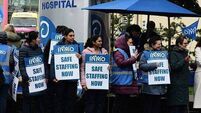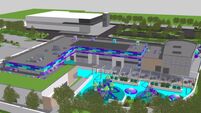Kildare cancer patients struggling with financial burden

Nathan Nash
A local cancer patient has spoken of the struggle to make ends meet due to mounting costs.
Households affected by cancer see an average loss of income of over €1,500 per month, around €18,000 over the course of the year. At the same time, day-to-day costs remain, like mortgages or rent, and additional expenses emerge for things like transport, medicines, wigs, parking, childcare etc.
27-year-old Nathan Nash of Naas was diagnosed with a rare blood cancer earlier this year. The father-of-two, who is a plumber, started chemotherapy in July.
He has had to grapple with the financial implication of his diagnosis, including mounting hospital parking fees and being declined a medical card.
“I’m not entitled to a medical card. I applied for an emergency medical card, that was declined. I appealed it and that was declined.
“They rejected my application on the basis that my income before I was diagnosed was too high, but that was from when I was working full-time, and I was fit and healthy.

“My wife has had to become my carer and can only work 17.5 hours a week. I worked full-time for 11 years before this. I never asked for any of this to happen and it’s been a shock to everyone.” Steve Dempsey, director of advocacy and communications, Irish Cancer Society, said: “Many cancer patients are going through the emotional and physical toll of cancer treatment while being crushed rising bills and struggling to make ends meet.
“We’re urging government to fully fund the National Cancer Strategy and to cut the costs for cancer patients in Budget 2025. Having cancer is hard enough, patients shouldn’t be worrying about paying for parking and medicines.” As well as calling for sustained, recurrent funding for the National Cancer Strategy, the Irish Cancer Society is urging government to ‘cut the costs’ in Budget 2025 and stop the endless charges on vulnerable cancer patients and their families. They are calling for abolishing of car parking charges for cancer patients and prescription charges; medical cards for all cancer patients and automatic entitlement to the household benefits package, fuel allowance and additional needs payment, and electricity credits for cancer patients in palliative care for the remainder of their life.





